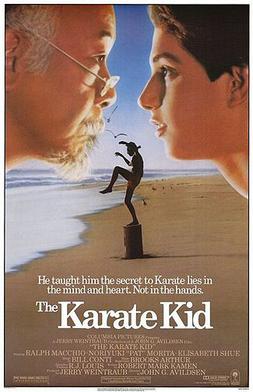I should address this, since my posted links often describe some absurd remake or reboot. Well, "Alice in Wonderland" had at least 9 film versions before Tim Burton got his hands on it. There are, actually, many times when a remake should be received with minimal cynicism and sarcasm. It's one thing to be annoyed by a petty attempt to wring some dollars out of the market. It's quite different to be annoyed every time a movie is "filmed again," though.
By the time I was in college, 9 "Friday the 13th" flicks and 7 "Freddy Kreuger" pictures were released in theaters. I saw 13 of those at least twice (blame my sophomore roommate), and 4 on a movie screen. I even found things to genuinely enjoy in some of the poorer entries. Does this mean I'm a jerk for deriding "Toy Story 4," "Analyze That," or "Clash of the Titans 2: This Time It's Personal?"
Certain public artworks have been been remade many times. I must point out that the bickering over a redone piece (like a song or movie) is often associated with a love for some long-gone "golden age" in which things were "better." If not, then the impulse is usually drawn to an older period in which, again, things are believed to be "better." Nostalgia, a sense of loyalty, or an unwillingness to accept change are frequently the culprits.
But the first "King Kong" premiered in 1933. It had a sequel, "Son of Kong," that same year. I might complain about Michael Bay's "Transformers" films, but that turn-around time was amazing. My snarkiness might be justified since KK was a great movie, whereas "Transformers" was mindlessly noisy junk.
Still, the classic 1910 "Frankenstein" was remade within 5 years. Then, in 1931, another important film iteration of the story emerged. That 1931 version was followed by 1935's "The Bride of Frankenstein." It's alive! And BoF led to another pair of films - one with Lon Chaney Jr. and Bela Lugosi, the other with Bud Abbott and Lou Costello.
I can't be "sarcastic as a rule" about remakes, since Frankenstein had been remade and retold many times before I was born. Including Kenneth Branagh's turgid and overwrought mess starring DeNiro as the monster, I count at least 6 more Frankenstein features. Going by title, the highlights of that list are "House of Frankenstein" [ooh] and "Frankenstein Meets the Wolf Man" [double ooh]. They were filmed in 1943 and '44.
Yes, certain stories have been excessively popular over the decades. Our modern hyper-capitalism is not the cause. There are scores of "Sherlock Holmes" films, not to mention numerous tv shows. Even 1997's mega-grossing "Titanic" was covered earlier, in 1943 and 1953. A little research shows that the first Titanic movie was actually made and released a few days after the ship's sinking. Yes, "In Nacht und Eis" a well-regarded German picture, was made in 1912. Facts like these do undercut complaints about the shlocky, money-grubbing, Hollywood system.
It's harder still when you look at quality film-makers like Alfred Hitchcock. He helmed "The Man Who Knew Too Much" twice. Michael Haneke made a German "Funny Games" in 1997, and an America-based version in 2008. I may have no desire to see Haneke's pictures, but he's got a reputation that I'd never ignore. It now sounds much more petty to whine about one director making "Ringu" in Japan, and then "The Ring Two" in America.
None of what I've written even takes into account one classic franchise, "The Wolf Man." The successful 1941 screening led to many remakes, reboots, and retries. Certainly, it's why audiences got 1981's, "An American Werewolf in London." Isn't it harder to complain since it led to a beloved modern effort? By the by, 1935 saw the release of a movie titled "Werewolf of London." Take that how you will.
I don't need to stick to blockbuster monster pictures to make my point. Biblical tales have been filmed over and over. So have movies based on certain disasters and crimes. Shakespeare, Dickens, and Dumas must account for 40+ movies among them, many with the exact same titles. Haven't many of those stories received excellent translation, repeatedly?
I gripe when a poorly-written flick gets a sequel. This often happens where the first picture manages to generate a lot of money, despite poor critical response and/or viewer satisfaction. I complain when sequels are announced within weeks of a financially successful film premiere. I roll my eyes and snark any time that I feel some studio green-lights a project that is just an effort to bank on "an existing and well-known intellectual property owned/leased by the studio."
As a child, I could only have dreamed that one decade would produce 3 movies involving the Alien from Ridley Scott's classic scifi thriller. Yet one picture was listless and senseless, while the other two were ill-made garbage. There could not have been many people praising 2004's "Aliens versus Predator," but there were enough viewers to warrant an awful follow-up in just 3 years.
Film remakes (distinct from "reboots") are a normal and natural thing in the movie industry. It is easy to be frustrated because of the modern hyper-exploitation of stories and characters that are owned by studios and producers. With some perspective, it's clear that such remakes have existed since shortly after the film industry began. This has sometimes resulted in great additions to the filmic canon; it also renews certain stories for later generations.
If Akira Kurosawa hadn't made "The Seven Samurai" in 1954, we'd never have seen John Sturges' "The Magnificent Seven." No one lost out there. That is an example of the best case scenario here - studios made money, artists added to their cache, and audiences were dazzled. I strive to be fair, so I can't deny that the principle works. Perhaps a later article will focus on when and how it doesn't...


No comments:
Post a Comment
Chime in!